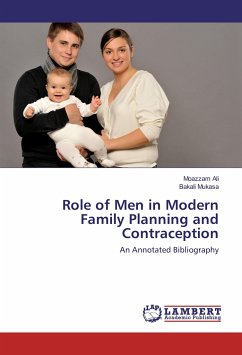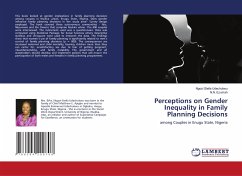
Role of Men in Modern Family Planning and Contraception
An Annotated Bibliography
Versandkostenfrei!
Versandfertig in 6-10 Tagen
19,99 €
inkl. MwSt.

PAYBACK Punkte
10 °P sammeln!
Since the 1994 International Conference on Population and Development (ICPD), interest in men's involvement in reproductive health has increased. Traditional fertility and family planning programs and policies in many low and middle income have been focused almost exclusively on women, though men are often the primary decision makers about family size, health services, and family planning methods. Unfortunately, these policies and programs have not had the expected success in increasing contraceptive prevalence and simultaneously reducing overall fertility, now increasingly the questions are r...
Since the 1994 International Conference on Population and Development (ICPD), interest in men's involvement in reproductive health has increased. Traditional fertility and family planning programs and policies in many low and middle income have been focused almost exclusively on women, though men are often the primary decision makers about family size, health services, and family planning methods. Unfortunately, these policies and programs have not had the expected success in increasing contraceptive prevalence and simultaneously reducing overall fertility, now increasingly the questions are raised on about the role men play in family planning. Evidence indicates that male involvement can lead to contraceptive uptake through the pathway of increased spousal communication. Engaging men in family planning has been found to improve programmatic outcomes and increase gender equality. This document examines the role men play, placing particular emphasis on men's sexuality, knowledge and attitude to contraceptive use. Various studies have shown that providing men with information and involving them in counseling sessions can help them to be more supportive of spacing and contraception.












